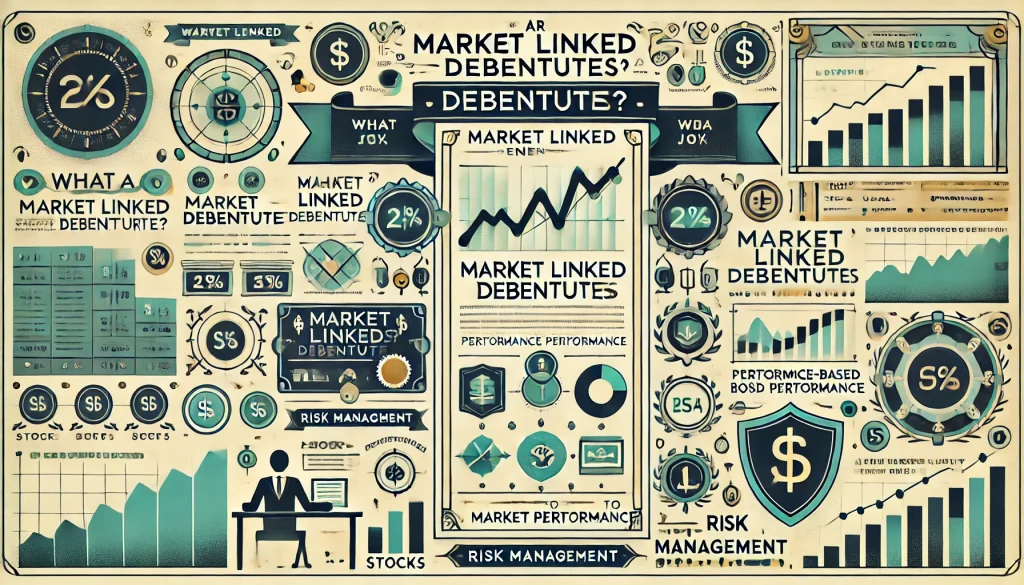
Non-convertible debentures (NCDs) have become a popular choice among investors for offering a fixed income. These are investments that do not rely on any collateral instead, they depend on the financial strength and goodwill of the company issuing them. Well-established companies use NCDs to raise capital from investors at a fixed interest rate.
In this article, we will explore in detail what a non-convertible debenture is, its types, features, advantages, disadvantages, and more.
What are Non-Convertible Debentures?
A non-convertible debenture is a long-term debt instrument which cannot be changed to equity shares by you. Big companies usually issue these financial tools. They give you a fixed income for a set period with fixed interest rates and you get your initial money back with the interest at the end.
Some debentures do not have any assets as security. So, when you decide to invest, you need to think about whether the issuer is trustworthy. Therefore, credit rating agencies’ scores are crucial as they reflect an issuer’s reliability.
Non-Convertible Debentures Example
To understand how a non-convertible debenture works let us take an example. Suppose you are an investor looking for a fixed-income investment and have therefore invested ₹10,000 in an NCD with a 4% coupon rate. In this case, you would receive ₹400 as your interest payment.
The company that issues these non-convertible debentures lists them on stock exchanges, and they are allocated on a first-come, first-served basis. Like bonds, NCDs also come with a maturity date when the issuer repays the initial investment.
Types of Non-Convertible Debentures
There are two types of non-convertible debentures available in India:
1. Secured NCDs
Secured NCDs are safer because the company’s assets back them. If, for some reason, the company cannot make its payments on time, you can get your money back by selling the company’s assets. However, the interest rates on these NCDs are usually low.
2. Unsecured NCDs
Unsecured NCDs are riskier than secured ones because the company’s assets do not back them. So, if a company cannot make its payments, investors have no choice but to wait for their payments because there are no assets to sell. However, the interest rate on unsecured NCDs is higher compared to secured NCDs.
Features of Non-Convertible Debentures
Here are the various features of non-convertible debentures:
- Issuance: Companies publicly issue NCDs via the open market where an investor can purchase them during a specified timeframe.
- Tradable Securities: Investors buy and sell non-convertible debentures on the stock market.
- Interest: The interest rate on non-convertible debentures is generally fixed. These interest rates are lower for companies with higher credit ratings and vice versa. Therefore, if you are investing in a highly-rated non-convertible debenture it will offer lower interest rates.
- Credit Rating: Some debentures come with no collateral security. As a result, companies having strong credit ratings can issue these debentures. Additionally, credit rating agencies conduct regular assessments of NCDs.
- Return Rates: An individual can earn returns from a non-convertible debenture in two ways: interest-based and growth-based mechanisms.
Benefits of Non-Convertible Debentures
A non-convertible debenture (NCD) offers several advantages, which are as follows:
- Liquidity: Investors can easily trade NCDs on the stock market, making them a liquid investment. This feature allows investors who invest in this bond to access their money quickly in case of emergencies.
- Diversification: Investing in NCDs enables individuals to diversify their investment portfolio, as well as help mitigate some of the risk.
- No Upfront Tax Deduction: Under Section 193 of the Income Tax Act, there is no upfront tax deduction (TDS) for securities issued by companies. However, it is important to note that non-convertible debentures held by Non-Resident Indians (NRIs) are subject to TDS under Section 195 of the ITA.
- Capital Appreciation: Since NCDs are listed on stock exchanges, investors can take advantage of stock market fluctuations.
- Interest Payout Options: NCDs offer various interest payout choices, including quarterly, monthly, half-yearly, and annual interest payment options.
How to Invest in NCD?
To invest in NCD, you can buy them directly from the issuer with the help of a brokerage firm or the stock exchange where they are available. You will need to go through an application process and provide your KYC and other required information. Once the application is complete, you can buy NCDs from the secondary markets, just like you do with stocks.
Who Can Invest in NCD?
The following are lists of investors who can subscribe to non-convertible debentures.
Category I (Institutional Category)
The institutional investors consist of the following:
- Statutory corporations, and public financial institutions
- Cooperative, commercial, and regional rural banks
- Insurance companies
- National Investment Funds
- Mutual funds
- Pension funds
- Venture Capital or Alternate Investment Funds
Category II (Non-Institutional Category)
The non-institutional investors comprise the following:
- Cooperative societies and registered body corporates in India
- Scientific or research organisations, provided they have authorization to invest in NCDs
- Partnership firms and limited liability partnership firms under the partners’ names
- Public, charitable, and private trusts, that have authorization to invest in NCDs
Category III (Individual Category)
The individual category investors include the following:
- Indian citizens
- Non-resident Indians (NRIs)
- Hindu Undivided Families (HUFs)
It is important to note that individuals under 18 years cannot invest in non-convertible debentures. Furthermore, foreign nationals cannot invest in such debentures unless the issuer receives specific regulatory approvals. Moreover, individuals who are not considered suitable and appropriate by regulatory bodies are also not allowed to invest in NCDs.
Factors to Consider Before Investing in NCD
The following are some important factors you should consider before investing in NCD:
- Debt Level: Before investing, it is crucial to examine the quality of a company’s assets thoroughly. Avoid investing if a business allocates 50% of its assets to unsecured loans.
- Credit Rating: This rating indicates a company’s financial strength and potential. It assesses the company’s ability to secure funds from both internal and external sources and measures its financial sustainability. You should choose a company with at least an AA rating for investment.
- Capital Adequacy Ratio (CAR): CAR evaluates a company’s capital resources and determines if it has sufficient funds to endure financial losses. For better outcomes, invest in a company with a history of maintaining a minimum CAR of 15%.
- Interest Coverage Ratio: The interest coverage ratio shows a company’s capacity to meet interest payments on its loans promptly.
In conclusion, companies often use non-convertible debentures to secure funds for specific business needs. It is important to understand the purpose and the intention of using these funds.
Remember, the interest rates alone do not determine the final returns for you in this type of debenture. It is equally vital to assess the financial health of the company to ensure they can meet their NCD payment commitments when they mature.
FAQs
A non-convertible debenture requires a minimum investment of ₹10,000.
No, you cannot withdraw from an NCD before its maturity, however, you can trade it on the secondary market.
The maturity period of non-convertible debentures ranges from 90 days to 20 years.
Yes, you can apply for NCDs in joint names. However, before applying It is important to ensure that both the applicants meet the eligibility criteria set by the issuer and provide all necessary KYC documents.
When the yield for an NCD drops, the value of the NCD rises. This is because the yield and the price of a bond or debenture move in opposite directions.

